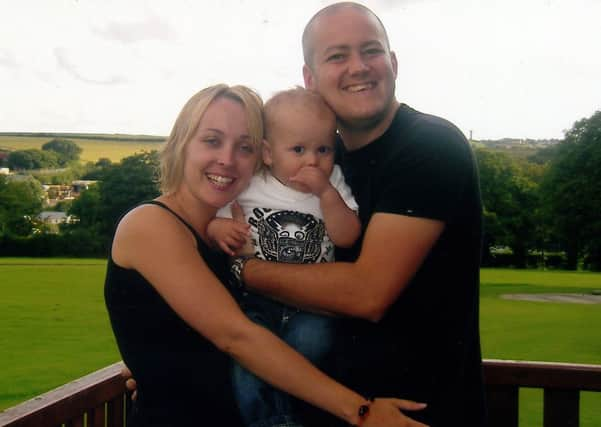Lee’s mum: “I can’t help thinking what if...”


The mother of a Clowne man who lost his battle with bone cancer is supporting a call for earlier diagnosis ahead of Bone Cancer Awareness Week, 5th - 12th October 2013.
Lee Marklew, 32, was misdiagnosed as having sciatica, because of his symptoms - pain in the lower back and leg.
Advertisement
Advertisement
For 18 months he had physiotherapy, but his condition worsened and a lump formed on his pelvis.
Finally, in January 2011, after a second opinion and MRI scan, Lee was diagnosed with a rare form of bone cancer called Ewing’s sarcoma.
Lee and his wife Elaine were married for seven years and have a son, Harry, five.
His mum, Beverley Peacock, said Lee never thought he was going to die.
Advertisement
Advertisement
“All I heard was the doctors say it was curable - that’s all I wanted to hear,” said Beverley.
Lee had chemotherapy, radiotherapy and even raised £35,000 with help from family, friends and the community, to go to for treatment in Mexico.
Said Beverley: “He was eating a strict organic diet and taking loads of supplements to help him fight it. I really think they helped him stay strong for so long. He looked the picture of health.”
But the cancer had spread to Lee’s lungs, and he died on 10th August 2012 during a second, more aggressive course of chemotherapy,
Advertisement
Advertisement
Said Beverley: “They said this chemo was kill or cure. If the chemo hadn’t killed Lee he wouldn’t have died with any dignity.”
“I can’t help but think what if he’d had a scan earlier, or done immunotherapy earlier.”
“I miss him so much and I’m so proud of how hard he fought. He was always determined in everything he did.”
• The Bone Cancer Research Trust has launched a specialist e-learning module to help doctors spot the symptoms and diagnose patients earlier.
Advertisement
Advertisement
• Studies show survival rates for primary bone cancer have not improved in 25 years. More common cancers have seen survival rates double in the last 40 years.
• Children and young adults are more likely to be affected. Painful bones or swollen joints can be misdiagnosed as sports injury or growing pains.